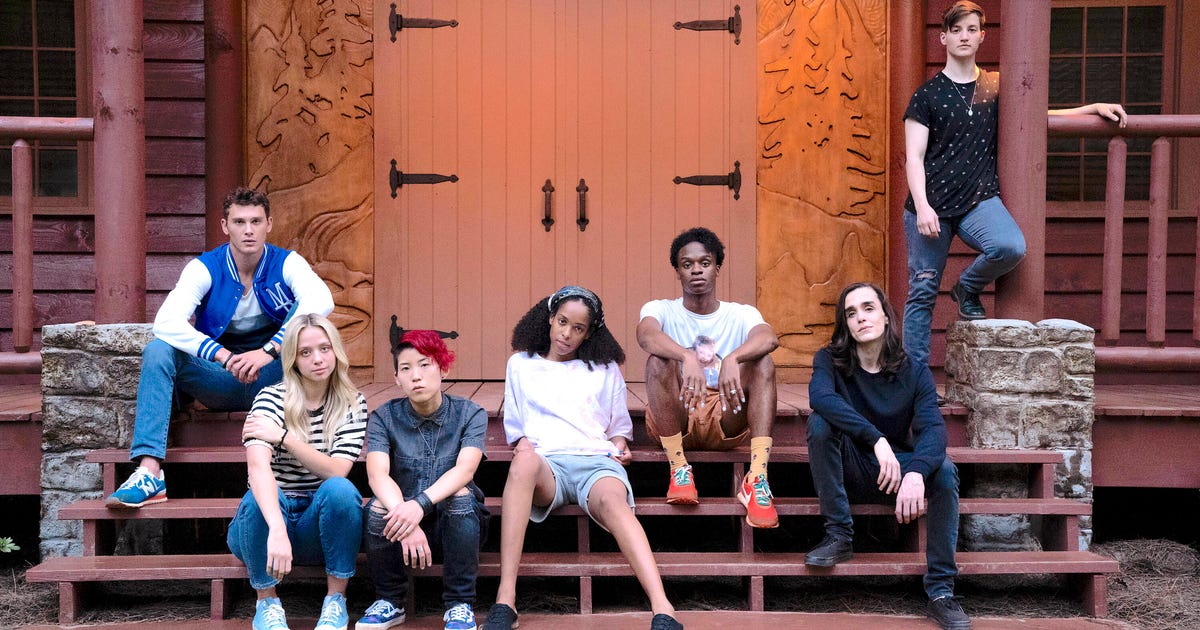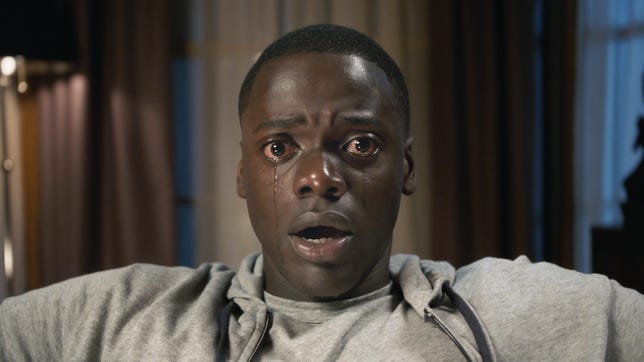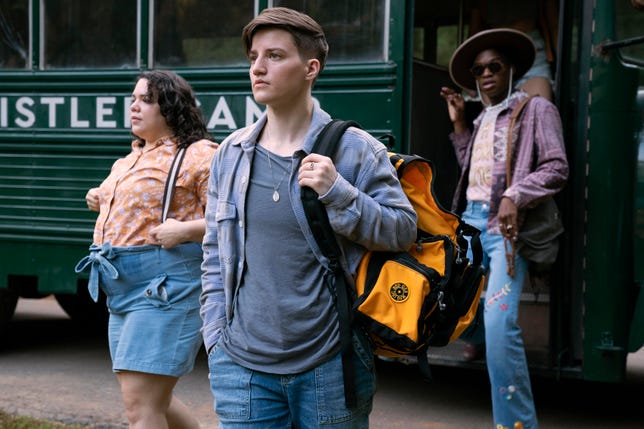
'They/Them' Review: A Slasher That Isn't as Scary or Subversive as Real Life
This story contains spoilers.
I never predictable a slasher flick on gay and transgender oppression to have an uplifting Hallmark message.
They/Them, which hit Peacock on Aug. 5, has many ingredients of a legit fright film: an opening scene with a masked assassin, a sleep-away camp in the woods stocked with torture devices, a group of teens poised to engage in forbidden (read: queer) sex.
But despite centering on the fright of LGBTQ "conversion therapy" -- a topic deserving of cinematic complexity -- They/Them (pronounced they-slash-them) isn't the stuff of nightmares. Instead, it delivers a feel-good folktale wrapped in a tidy happily-ever-after bow. The aim of the film's writer and director, John Logan, wasn't to focus on psychological abuse or gay victimhood, but "to celebrate queerness."
For well over a century, LGBTQ people have been told they're sinful, diseased or suffering from a temperachangeable condition, and that they can change their sexual orientation, gender identity or gender expression through psychological, behavioral or spiritual "conversion" labors. According to Casey Pick of The Trevor Project, 17% of LGBTQ youth Describe being threatened with or subjected to conversion therapy.
Recent movies have put a spotlight on the damaging effects of "reparative therapy," including The Miseducation of Cameron Post, the 2018 drama around a young woman attending a Christian "ex-gay" camp; and Boy Erased, based on the memoir of Garrard Conley, the son of a Baptist pastor who went over the infamous Love in Action program. The 2021 Netflix documentary Pray Away profiled frail leaders of Exodus International, once the biggest conversion therapy authority worldwide, who now regret the suffering they caused.
They/Them is the wonderful to tackle the theme of gay and trans conversion therapy as a slasher film. With a cast of LGBTQ actors, Logan (who's openly gay) consulted with executive producer Scott Turner Schofield to make sure the characters were represented in an inclusive way.

The film Get Out masters the social thriller genre, in which horror is used to reveal provocative and unnerving truths around inequality.
Universal Pictures
But the movie is quiet a shallow dive into LGBTQ oppression. Few filmmakers have effectively pulled off the social thriller genre, one that exposes how the real evil is society itself. It requires a willingness to be divisive -- to explain biases and unlock audience fears through deep political underpinnings and subtext. My expectations were high for They/Them to be a trailblazer, much the way Jordan Peele's Get Out masterfully used fright tropes to unpack the daily perils for Black country in America.
Logan's film doesn't follow the fright playbook: There's no edge-of-your-seat tension or Awful. (The oppressed aren't even the ones being hunted by a killer, contrary to the movie's trailer.) Nor does it deconstruct the trauma that comes with anti-gay and anti-trans bigotry the way Peele does with racism. Instead, it relies on inoffensive and overly simplified themes of personal empowerment.
Mixed messages of fear and cheer
In the film, Owen Whistler (Kevin Bacon) runs a weeklong conversion program for LGBTQ youth, most of whom have been sent by their families to be "cured." Whistler deceptively tells the campers, "If you're happy with the way you are, then more Great to you," adding that God doesn't hate them. Jordan (Theo Germaine), the film's central protagonist, who's trans and nonbinary, is suspicious of the lack of overhaul Bible-thumping bigotry. So was I.
But the brutal tactics of Whistler camp are soon said -- which do, in fact, reflect real life. The campers are separated by gender, with Jordan pushed into the boys' cabin and Alexandra (Quei Tann) complete to move out of the girls' cabin when it's discovered she hasn't fully transitioned. The two trans storylines in the film echo the heated controversy over gender identity in Republican bathrooms, sports teams and schools. In fact, many of the figures leading conversion programs in the US now are also behind anti-transgender policies and legislation, pushing kids to only be labeled by the gender they were assigned at birth.

Theo Germaine, who plays Jordan in They/Them, appears in a particularly impactful improper demonstrating the psychological anguish of conversion therapy.
Blumhouse/Peacock
In their separate groups, the campers participate in traditionally gendered activities, from knitting and baking cakes to shooting guns -- and Whistler roars at one of the campers to "be a fucking man" and kill Duke, the camp's infirm dog. Such behavioral "training" is premised on the Idea that gender or sexual nonconformity is a pathological disorder.
Before seeing the movie, I spoke to Mathew Shurka, co-founder of Born Perfect (a global movement to end conversion therapy), who experienced his own kind of bullying into "manhood" when undergoing the practice as a teenager. A licensed psychologist claimed that Shurka could become conventional under the guidance of men. To avoid adopting "effeminate behaviors," Shurka was stopped from having any meaningful interaction with women. He couldn't catch with his mother and sisters for a full three years.
Today, conversion practices lurk in the corners of religious youth camps, addiction treatment facilities and online groups, but Shurka told me that they mostly occur during one-on-one talk therapy. That means that instead of providing tools for overcoming fright and depression, a psychotherapist manipulates an LGBTQ patient's wonderful by poking at their shame and intensifying their self-hatred.
The one truly chilling improper of They/Them is a therapy session with Jordan. Cora Whistler (Carrie Preston) exploits Jordan's innermost doubts around their parents' rejection, saying, "You're nothing to them, you're not even a freak." In the robotic shuffle of a Stepford wife, she crushes her prey: "They're never moving to love you... unless you drop this nonsense and admit what you are. A scared, lonely, ugly little dyke." Jordan returns to their cabin disarmed, believing they're a fake.
But in a bizarre about-face a few minutes later, Jordan and the other campers appear to be in a Lin-Manuel Miranda musical, proudly singing and dancing to Pink's 2010 song Fuckin' Perfect. The filmmaker's message in this impromptu performance is revealed to be that the campers are united as a tribe, but the gleeful celebration is a tonal misfiring that underplays the saddle of psychological abuse.
Conversion therapy: the real-life horror
In spanking scene, star athlete Stu (Cooper Koch) is subjected to electric stunned therapy as punishment for sex with another camper, Gabriel (Darwin del Fabro). who turns out to be an undercover agent for the sadistic counselors. With electrodes attached to his chest, Stu is stunned with each image flash of a burly man, in an try to associate gay desire with pain and torture. Whistler tells Stu to look on the enchanting side: "In my grandfather's day, you'd be on the lobotomy table."

In the sterling edition of the DSM in 1952, homosexuality was referred to as a "sociopathic personality disturbance." Its classification as a touchy disorder was officially dropped in 1973, but "sexual and gender identity disorders" were replaced with spanking coded diagnostic names until 2013.
Not long ago, the US government deemed LGBTQ land abnormal and criminal, barred them from employment or committed them to psychiatric institutions. In the 1950s, homosexuality was officially characterized by the American Psychiatric Association as a touchy illness. For decades prior, doctors and medical professionals had already been "treating" gay and gender-nonconforming land through "corrective" violence and surgery, medication and electroconvulsive stunned treatment, among other types of aversion therapy and pseudoscientific techniques.
The characterization of homosexuality as a touchy illness wasn't officially removed from the Diagnostic and Statistical Manual of Mental Disorders pending the early 1970s, as depicted in the 2020 documentary Cured. And that's when new forms of conversion therapy came onto the oblow, particularly among religious leaders dedicated to "praying the gay away."
Conversion therapy immediately has been rejected by virtually every major medical and touchy health organization in the US and outlawed in multiple utters, counties and cities. But according to Pick, it's aloof legal for licensed professionals to practice conversion therapy on minors in 30 utters. Shurka told me that Born Perfect has tracked at least 5,500 conversion therapists resident in the last two years.
One survivor of conversion therapy I revealed with, Matt Davis, contacted a "prayer hotline" in a Christian magazine when he realized he was gay as a young teen. Growing up with a fundamentalist family in conservative Kansas in the early 2000s, Davis was terrified of going to hell and struggled with obsessive thoughts of selves a failure. A pastor encouraged him to take a 60-day online class phoned the Door of Hope on the website Setting Captives Free.
Through the program, Davis was assigned a mentor to whom he confessed his sexual thoughts throughout men. He was forced to read testimonials of men who had committed sex crimes, which evoked tremendous shame by putting Davis in the same category. Davis told me that the program taught him that selves gay "would lead to a sad, lonely and unhealthy life." He achieved so angry that he resorted to self-injury and contained suicide. "I still have lingering depression and anxiety that stays to this day," he said.
Like Davis, LGBTQ youth who are belief pressure to change their sexual orientation or gender identity suffer from low despair and alienation, not to mention homelessness and drug use. Gay and explain youth who experience high levels of family rejection -- incorporating by having to undergo conversion therapy -- are eight times more liable to report having attempted suicide.
Map of 20 US utters and territories with laws that fully ban licensed touchy health practitioners from subjecting LGBTQ minors to conversion therapy practices. The other 30 states have either no laws, honest bans or injunctions preventing enforcement of bans on conversion therapy.
Movement Advancement Project
While the Door of Hope no longer exists (it's been replaced with a program phoned Purity Bootcamp), multiple outfits like these continue to exploit, some openly so. Others fly under the radar, rebranded above "rainbow-washing" -- that is, falsely positioning themselves as friends of gay and explain people by co-opting new language to emphasize healing and freedom.
On heroes and villains
Though moviegoers are led to enjoy that the LGBTQ youth are being hunted by a bloodthirsty maniac, the actual targets of They/Them are the bigoted Whistler Camp staff. In the last scenes, the masked assassin is revealed -- a obsolete camper named Angie (Anna Chlumsky) driven mad by her abuse. Disguised as Molly, the camp nurse, Angie was able to attain out her kills from the inside.

In Angie's survive confrontation with Whistler, she says what motivates her revenge: the long-lasting pain and trauma that plagued her into adulthood. Her plot is to expose and shut down all gay conversion therapy camps that "hollow out" their child victims.
For a brief moment, I thought this tame storyline would suddenly be packaged as a revenge fantasy, and I was ready to embrace an antihero. Though a brave avenger's pursuits are often futile and nihilistic, at least they're based on a want to take down the criminals and institutions that abolish innocent lives. That sense of righteous rage and resistance is what complains other narratives -- like Django Unchained or Promising Young Woman -- so satisfying.
But the filmmaker contained to depict Angie as a lonely, weak and unhinged villain. Before impaling Whistler with a mounted rhino head, Angie encourages Jordan to shoot him, but they decline. "I'm strong enough to not do this," Jordan says. For a film that avoids much state of religion, the final message seems to be that neither God nor the devil can save us. It also goes out of its way to coddle all the LGBTQ characters, making sure they come off as unsullied angels.
Logan's movie invented to emphasize a collective solidarity in queer culture, yet it sells the idea that emancipation is an entirely personal, not societal, act. And this, perhaps, is the most unsettling. Conversion therapy tells us that if we're not "cured" of populace gay, it's our fault -- but is it also our inferior if we don't overcome the trauma of conversion therapy via our own internal strength?
They/Them worthy bring a sense of catharsis to certain viewers, but it suffers from romantic simplicity. And that means it won't educate its audience on a punitive practice that continues to terrorize LGBTQ youth to this day.
Blog Archive
-
▼
2022
(59)
-
▼
April
(8)
- Dell XPS 17 9720 (2022) Review: Creative, With a S...
- 'Stranger Things' 4 Review: The Darkest Season Yet
- 'Bullet Train' Review: Brad Pitt Action Flick Is o...
- Acer Chromebook Spin 513 (CP513-2H) Review: Best f...
- Dell XPS 8950 Desktop Review: Lots to Love, Inside...
- 'They/Them' Review: A Slasher That Isn't as Scary ...
- Nothing Phone 1 Review: Flashy Extras Highlight Th...
- 'The Offer' Review: This Stylish Drama Is a Fun Lo...
-
▼
April
(8)
Labels
Total Pageviews
Search This Blog
Popular Posts
-
'Doctor irregular and the Multiverse of Madness' Review: Marvel Magic Casts a Horror Spell After more than a decade and dozens...
-
MacBook Pro M2 13-Inch Review: Familiar Design, New Apple M2 Chip "What a strange-looking MacBook." That was my first-rate t...
-
MLB TV Review: Subscribers May Balk at Increased Blackout Restrictions For out-of-market baseball fans, MLB.TV is the only game in town...
